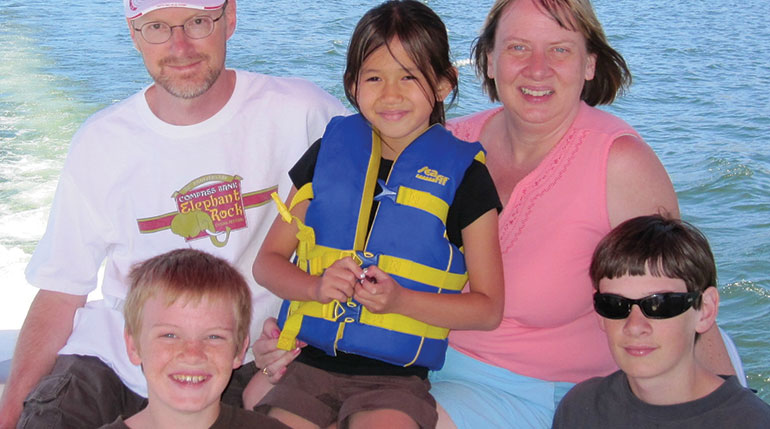On the first morning of spring break, we told the boys that our plane to Orlando would leave in two hours. After a year of trudging through paperwork, saving, and traveling to Ukraine for five weeks without our seven-year-old son, we wanted to celebrate as a family and welcome our newly adopted, 13-year-old son, Vadim. We needed a family vacation, and the dreary Cincinnati winter left us craving Florida sun.
The boys’ reactions were just what we had hoped for. Jacob and Vadim ran through the airport, their giddiness contagious to other travelers. My husband and I felt like the best parents ever.
When we landed in Orlando, however, something changed for Vadim. He got upset and said, “You no love me,” and “I no like family.” He refused to leave the hotel room, threatened to run away, and sulked for hours. We couldn’t make Vadim happy. By the end of the trip, Jacob’s patience was pushed past its limits, and my husband and I were sniping at each other.
Now the boys reminisce about the safari at Animal Kingdom and riding Thunder Mountain. Our photos show the happiest family ever, but they belie the fact that, most of the time, the kids were pouting, while we were shocked that this trip could be so unpleasant.
In his first three months with us, Vadim adjusted well at home and at school. His English improved, and he got along with his brother. The boys asked to go to Disney World. What went wrong? Now that PDSD (Post-Disney Stress Disorder) is easing, we’re realizing what we should have known.
1. Surprise—Not a Good Idea.
Lack of control is a stressor, and even positive changes may be stressful. A child who has never been on a vacation may feel like he is in freefall. If we had involved Vadim in the decision-making, the experience would have been smoother. Showing pictures and talking about activities—and providing a daily schedule—can create positive expectations and relieve the stress that comes from unpredictability.
2. Too Many Choices.
We can go to the pool, the arcade, and any or all of the four parks. You can have chicken, hamburgers, or pizza. Children who come from an orphanage have never had choices, so they won’t do well with them, especially if they don’t know what the choices entail. Vadim was overwhelmed when given choices of foods or activities. Providing a few selected options may have reduced this frustration.
3. Too Much Stimulation.
Many internationally adopted children have sensory and attention problems. Although Vadim’s daily functioning is great, he is quickly distracted and overwhelmed. Disney World is loud and crowded. An overstimulated child needs down time, not a full day of activities.
4. Too Much Togetherness.
Being together in a hotel room can bond a family, but it doesn’t allow alone time. Perhaps the one-room situation reminded Vadim of his life before the orphanage. When the boys fought, they couldn’t escape each other. At home, each can get away for a while, but here, it was togetherness 24/7. Splitting up for short periods each day would have relieved the tension.
5. Overestimated Adaptability.
Because Vadim was doing well at home, we assumed he’d cope in another setting. It was too soon after joining our family to make another major life adjustment.
6. Unrealistic Expectations.
My husband and I wanted our vacation to be perfect, and we wanted the boys to be happy and appreciative. But children aren’t appreciative very often, and to adopted children, expressing appreciation exposes their vulnerability. We should not have expected gratitude, and we should have let go of the perfect-family ideal. We might have enjoyed the few things that were fun on the trip.
Would we do it again? I don’t know. I’d wait a few months, and I’d plan the trip differently. After we got home, Vadim called his older sisters in Ukraine to tell them about his adventure, and he talked positively and animatedly. Maybe the trip was worth it. Maybe it will contribute to his sense of family and leave memories he will cherish. Reflecting on the experience reminds us that we do not have a difficult or unappreciative child. We are working it out, learning as we go how to be a family.


